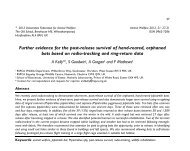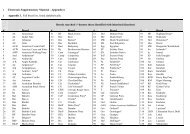2010-2011 Annual Report - Universities Federation for Animal Welfare
2010-2011 Annual Report - Universities Federation for Animal Welfare
2010-2011 Annual Report - Universities Federation for Animal Welfare
You also want an ePaper? Increase the reach of your titles
YUMPU automatically turns print PDFs into web optimized ePapers that Google loves.
Research<br />
Professor William Russell Fellowship<br />
UFAW established this Fellowship in memory of Professor William<br />
Russell, who with Rex Burch published their UFAW work on ‘The<br />
Principles of Humane Experimental Technique’ in 1959.<br />
Professor Joe Garner of Purdue University, USA is the recipient of<br />
this award and is researching the housing of mice with relation to<br />
temperature. Mice used in research are typically housed at ambient<br />
temperatures of between 20-24°C which is below their<br />
thermoneutral range. In a recent paper Joe and his colleagues<br />
showed that when housed in typical temperatures, mice modify<br />
their nest to improve its thermal qualities. Despite their ability to<br />
do this, mice with access to nesting material still preferred a<br />
temperature of 30°C when given the choice.<br />
<strong>2011</strong> <strong>Animal</strong> <strong>Welfare</strong> Research Training Scholarship<br />
UFAW has awarded its eighth <strong>Animal</strong> <strong>Welfare</strong> Research Training<br />
Scholarship to Alastair Cockburn. Alastair will take up his position<br />
in October and will be studying under Mike Mendl, Professor of<br />
<strong>Animal</strong> Behaviour and <strong>Welfare</strong> at the School of Veterinary<br />
Science, Bristol. The aim of Alastair’s research is to develop<br />
methods to detect subtle indications of pain in dogs suffering from<br />
the genetic conditions syringomyelia and osteoarthritis (see the<br />
UFAW website which has a database<br />
of in<strong>for</strong>mation <strong>for</strong> prospective buyers<br />
to help reduce the incidence of these<br />
conditions in dog breeds). Dogs with<br />
syringomyelia and osteoarthritis may<br />
be suffering chronic pain, but<br />
detecting whether or not this is the<br />
case can be difficult as the signs<br />
displayed by the dogs are often subtle.<br />
A further aim of Alastair’s project is to<br />
investigate the relationship between<br />
any signs of chronic pain and<br />
indicators of negative mental states<br />
(using cognitive bias methodology), so<br />
as to determine whether the signs are<br />
indications that the dogs are actually experiencing pain or are<br />
merely responses to nociception (pain pathways and responses that<br />
do not involve conscious emotional experiences). Hence this work<br />
builds on previous ground-breaking research by UFAW Scholar<br />
Emma Harding who, under Mike Mendl’s supervision, developed<br />
the use of the cognitive bias in animal welfare research.<br />
UFAW 3Rs Liaison Group<br />
Refining cancer studies by assessing the welfare of<br />
laboratory mice<br />
Claire Richardson is now approaching the end of her PhD study as<br />
a UFAW 3Rs Liaison Group student at Newcastle University<br />
where she has been investigating how to improve the welfare of<br />
mice used in cancer research. Mice are the animals most frequently<br />
used <strong>for</strong> studying cancer. In 2009 just over 430,000 animals were<br />
involved in cancer studies within the UK and of these, over 96%<br />
were mice. Claire has been developing methods to identify which<br />
cancer models may be associated with pain or distress and when<br />
these negative states might occur. She has been using an<br />
automated home-cage monitoring system that allows the mice to<br />
be studied intensively, but undisturbed, in their normal social<br />
environment. As expected, Claire’s studies have shown differences<br />
in morphine-seeking behaviour between mice with various types of<br />
cancer such as bladder, subcutaneous and intramuscular tumours.<br />
These and other data collected by Claire will be valuable in<br />
in<strong>for</strong>ming decisions regarding better methods to reduce the pain<br />
experienced by these animals.<br />
Searching <strong>for</strong> replacements<br />
<strong>for</strong> animal use in emetic research<br />
Stephen Robery continues his PhD<br />
research on the possibility of using<br />
Dictyostelium discoideum, a soil-living<br />
amoeba, to screen drugs <strong>for</strong> any<br />
nausea inducing side-effects. The<br />
need <strong>for</strong> this research is to avoid use<br />
of sentient animals to screen <strong>for</strong><br />
emetic liability. Stephen and his coworkers<br />
have submitted a paper to<br />
Plos One, in which they suggest that<br />
while their results indicate that<br />
Dictyostelium has limited utility in identification of emetic agents in<br />
general, it appears that Dictyostelium has potential as a<br />
non-sentient model in the analysis of the molecular effects of<br />
taste agents.<br />
Small Project and Grant Awards<br />
UFAW seeks to advance the welfare of<br />
animals through supporting young<br />
researchers. Two students who received<br />
funding in <strong>2011</strong> were Ms Hazel Stewart,<br />
University of Glasgow, and Ms<br />
Katharine Evans, University of<br />
Nottingham. Ms Stewart received<br />
support to present her work on feline<br />
leukaemia virus (FeLV) at an<br />
international meeting on retroviruses. She hopes that her<br />
research will, in the long term, contribute to a more efficient<br />
vaccine <strong>for</strong> cats against this important virus. Ms Evans was<br />
awarded a grant to enable her to give an oral presentation of her<br />
work on Otterhound health and mortality at the Conference <strong>for</strong><br />
Research Workers in <strong>Animal</strong> Diseases,<br />
Chicago. The worldwide population of<br />
Otterhounds is small and in the UK<br />
Otterhounds are categorised as a<br />
vulnerable native breed by the UK<br />
Kennel Club. When a breeding<br />
population is small and has limited<br />
genetic diversity the risk of breedspecific<br />
inherited diseases is increased.<br />
Ms Evans hopes that the results of her surveys, and an on-going<br />
longitudinal survey in combination with pedigree analysis, will<br />
enable Otterhound breeders to make more in<strong>for</strong>med decisions<br />
about which dogs to breed from and so reduce the prevalence of<br />
inherited welfare problems.<br />
Science in the Service of <strong>Animal</strong> <strong>Welfare</strong> 6




